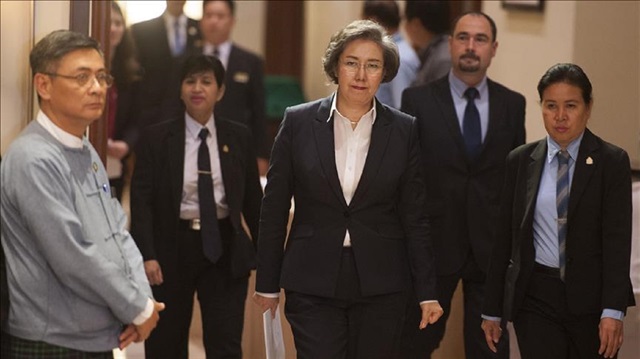

UN special Rapporteur on human rights in Myanmar Yanghee Lee
In December, Myanmar authorities told UN investigator Yanghee Lee they would not grant her access to the country
A UN investigator who was denied access to Myanmar will be visiting Bangladesh and Thailand on Jan. 18-30.
In December, Myanmar had denied access to Yanghee Lee, the UN’s special rapporteur, who was set to visit the country in January to assess the human rights situation.
"I am determined to carry on -- to the best of my ability -- this very important task of helping the victims of human rights violations and abuses in Myanmar, as mandated to me by the United Nations system,” Lee said in a statement on Tuesday.
"By not giving me access to Myanmar and by refusing to cooperate with the mandate, my task is made much more difficult, but I will continue to obtain first-hand accounts from victims and witnesses of human rights violations by all means possible, including by visiting neighboring countries where some have fled," she said.
Lee will visit Bangladesh on Jan. 18-24 and Thailand thereafter until Jan. 30.
In Bangladesh, Lee has been planning to visit Dhaka and the refugee camps and settlements near Cox’s Bazar to meet refugees and community leaders.
"The Government [of Myanmar] has accused me of bias, while at the same time denying that human rights violations have taken place in Myanmar,” said Lee and added: "I would ask the authorities to rethink their position, and to put the victims first."
"I have a responsibility to speak on behalf of these victims, and I will not be deterred. This is why I am going ahead to visit neighboring countries to reach out as far as possible to all victims and witnesses to learn of their experience," she added.
Following her visit, Lee will present a report on Myanmar to the UN Human Rights Council in March.
The Rohingya, described by the UN as the world's most persecuted people, have faced heightened fears of attack since dozens were killed in communal violence in 2012.
Since Aug. 25, 2017, some 650,000 refugees, mostly children and women, fled Myanmar when Myanmar forces launched a crackdown on the minority Muslim community, according to the UN. At least 9,000 Rohingya were killed in Rakhine state from Aug. 25 to Sept. 24, according to Doctors Without Borders.
In a report published on Dec. 12, the global humanitarian organization said that the deaths of 71.7 percent or 6,700 Rohingya were caused by violence. They include 730 children below the age of 5.
The UN has documented mass gang rapes, killings -- including of infants and young children -- brutal beatings, and disappearances committed by security personnel. In a report, UN investigators said such violations may have constituted crimes against humanity.
#Myanmar
#UN
#Yanghee Lee



